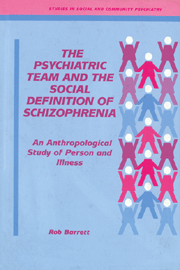 The Psychiatric Team and the Social Definition of Schizophrenia
The Psychiatric Team and the Social Definition of Schizophrenia Published online by Cambridge University Press: 05 August 2016
Like the arrangement of buildings and the narrative history of the hospital's evolution, clinical work was structured in space and time. This chapter looks at the meanings that space and time had in the professional culture of Ridgehaven Hospital—how, for the clinical staff, they became a particular 'work space’ and ‘work time’ (c.f. Zerubavel 1979). It examines three central professions: psychiatry, psychiatric nursing, and social work. Each differed in its structure, its characteristic mode of practice, and the way in which the work space and work time of its members was organized. These differences were reflected in the distinct perspective that each profession brought to bear on the people they treated. I examine these perspectives in turn and explore their implications for the way clinical staff rendered a person as a case of psychiatric illness.
The starting point of this discussion is a sociological argument about the nature of the professions. Sociological research in this field initially focused on the characteristic traits of the professions. They included special skills, a complex and abstract body of knowledge, prolonged training, and an ethical or altruistic orientation. More recent scholarship, especially the work of Freidson (1986:20-40), argues that such research tended to reiterate the ideology employed by professionals to justify their prestige and defend their institutional power. It failed to analyse the economic and political power of the professions in relation to the state. Freidson (1970:71- 84) argues that it is autonomy of practice, by which he means 'legitimate control over work', that is the paramount feature of professional organizations. Whereas Freidson was concerned with autonomy and power at the macroscopic level of professional organizations and their relation to the state, I re direct and extend this analysis by examining the manifestations of professional autonomy and power in the day-to-day work of a psychiatric hospital. In this clinical context, the main expression of power was the capacity to define cases of psychiatric illness. From this power flowed the means to distribute cases across the hospital.
Since World War II Ridgehaven had seen a striking growth in the absolute number of professional workers, the number of professional groups represented, and the internal differentiation within each group.
To save this book to your Kindle, first ensure [email protected] is added to your Approved Personal Document E-mail List under your Personal Document Settings on the Manage Your Content and Devices page of your Amazon account. Then enter the ‘name’ part of your Kindle email address below. Find out more about saving to your Kindle.
Note you can select to save to either the @free.kindle.com or @kindle.com variations. ‘@free.kindle.com’ emails are free but can only be saved to your device when it is connected to wi-fi. ‘@kindle.com’ emails can be delivered even when you are not connected to wi-fi, but note that service fees apply.
Find out more about the Kindle Personal Document Service.
To save content items to your account, please confirm that you agree to abide by our usage policies. If this is the first time you use this feature, you will be asked to authorise Cambridge Core to connect with your account. Find out more about saving content to Dropbox.
To save content items to your account, please confirm that you agree to abide by our usage policies. If this is the first time you use this feature, you will be asked to authorise Cambridge Core to connect with your account. Find out more about saving content to Google Drive.